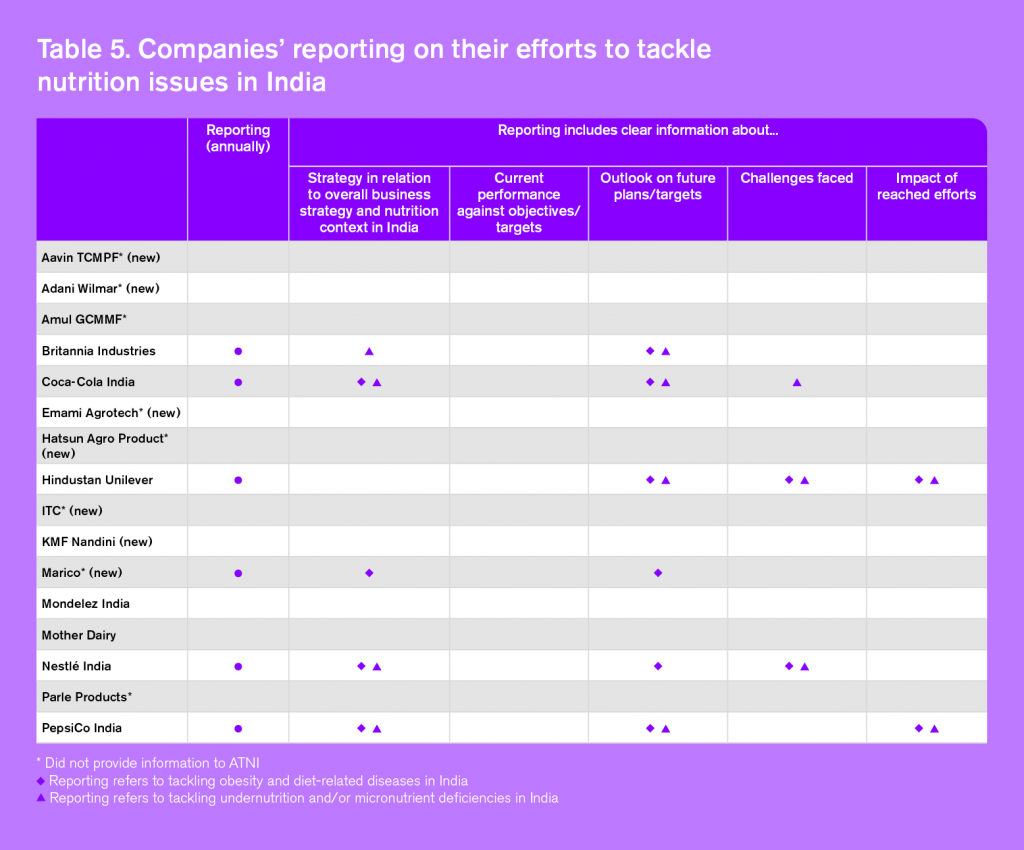Category A: Governance
Corporate strategy, management and governance (12.5% of overall score)
The results of Category A are presented here. For a food and beverage company to improve all aspects of the business that affect access to nutrition, its commitment must depart from its commercial strategy.
Category A consists of three criteria:
-
A1
Corporate nutrition strategy
-
A2
Nutrition governance and management systems
-
A3
Quality of reporting
To perform well in this category, a company should:
- Have a mission and commercial strategy focused on health and nutrition factored into all major business decisions and functions;
- Take action to address the double burden of malnutrition in line with national nutrition priorities and has a focus on people experiencing or at high risk of malnutrition
- Assign oversight of its nutrition strategy and/or programs to the CEO and undertakes regular internal audits and reviews;
- Implement a certified food safety management system and track and prevent food loss and waste centrally
- Comprehensively report on its approach to preventing and tackling all forms of malnutrition in India
Context
Malnutrition is one of the principal limitations of India’s global economic potential (Copenhagen Consensus, 2012). should commit to delivering more affordable, healthy products, while making specific references to reaching groups that experience or are at a high risk of malnutrition with such products. As a result, how a company comprehensively addresses all forms of malnutrition (including undernutrition, micronutrient deficiencies, obesity and diet-related diseases) should be based on the specific nutrition issues in the Indian market, as defined by public authorities. The results from the first phase of the fifth and the latest round of the National Family Health Survey (NFHS-5), conducted in 2019-2020, indicate a decline in nutritional status of children under 5 years. Anemia among women also remains a major cause of concern and obesity among adults is increasing.
Socioeconomic, geographic (urban/rural, states, districts, etc.) and health and nutritional factors are relevant in identifying the needs of groups experiencing or at a high risk of malnutrition. In addition, companies should also recognize the nutrition and health priorities set out in the National Nutrition Strategy and Vision 2022 – Kuposhan Mukt Bharat and/or POSHAN Abhiyaan (Prime Ministers’ Overarching Scheme for Holistic Nourishment) as part of India’s National Development Agenda in the development of their nutrition strategies .
Full India Index Context chapterHow are nutrition strategy, management systems and reporting relevant to the COVID-19 crisis?
- India’s focus on the dual burden of malnutrition (NITI Aayog’s National Nutrition Strategy 2017, and POSHAN Abhiyaan) is very relevant in light of COVID-19, as overweight/obesity increases risk of negative COVID-19 outcomes, and undernutrition and micronutrient deficiencies may reduce immune function.
- It is essential that India’s leading food and beverage companies focus more than ever on healthy diets and good nutrition during crisis. They should redouble their efforts to adhere to all relevant product standards, responsible marketing practices and responsible use of health and nutrition claims in line with government/Food Safety and Standards Authority of India (FSSAI) guidance. Product fortification should be intensified and efforts to ensure such products reach those who need them increased, as recommended by FSSAI.
- As highlighted in ATNI’s report on the impact of COVID-19 in India, for the companies assessed in the India Spotlight Index 2020 publicly disclosed information about their response against COVID-19 at the country level is limited. This has hampered ATNI’s work in assessing the impact of actions taken in almost a year since the pandemic began. India Index companies are encouraged to report publicly on their approaches to dealing with COVID-19.
- Companies must also ensure value chain stability, employee safety and job security. Although the India Spotlight Index 2020 research did not include indicators to score and rank companies’ responses to the COVID-19, ATNI did talk to companies about their initial coping strategies and responses to the pandemic between March and June 2020. ATNI has been tracking publicly available information on industry’s response globally to the COVID-19 crisis, including in India, and reported on trends, best practices and areas of concern in separate reports. Read more about how companies can positively contribute to addressing the global nutrition challenges in ATNI’s COVID-19 Project.
Main messages
- Hindustan Unilever is a leader in the area of corporate strategy, governance and management, with a score of 7.8; followed by Nestlé India (7.3). While the latter ranked first in the 2016 Index, Hindustan Unilever’s strong disclosure has boosted its score and resulted in it leading this Category Governance overall.
- In general, most companies (14) commit to placing a strategic focus on nutrition and health, and to delivering more healthy products. Eight of them also make specific references to reaching groups that experience or are at risk of malnutrition when committing to deliver more healthy products.
- In contrast, only five companies make the commitments in their nutrition strategy specific by recognizing the nutrition and health priorities set out in the National Nutrition Strategy and Vision 2022 and/or in POSHAN Abhiyaan. Nestlé India stands out for its comprehensive approach: it is the only company to refer to all groups experiencing or at risk of malnutrition.
- Companies’ performance on other elements that are indicative of integrating a focus on nutrition into their core commercial strategies and management systems is similarly variable. Nine companies reported that healthy products have contributed positively to their financial performance in the last three years, five conduct regular nutrition-related business risk assessments and seven state that they have assigned oversight for implementing their nutrition strategy to a CEO or board-level committee. Only Hindustan Unilever and Nestlé India report having undertaken comprehensive market research to assess unmet needs of groups experiencing or at high risk of undernutrition and/or micronutrient deficiencies. Together with PepsiCo India, these are the only three companies that specifically address the double burden of malnutrition in their commercial strategies. Further, all but three companies (for which no information was found) obtained recognized food safety certifications.
- A new aspect of the 2020 India Index is an assessment of the extent to which companies have mechanisms in place to prevent and reduce food loss and waste in the production process. In this regard, six companies include food loss and waste tracking and prevention tools in their management systems, which include value stream mapping and setting key performance indicators (KPIs).
- Only six of the companies publish formal, regular reports on their approach to preventing and tackling malnutrition in India, with most of those covering the dual burden of malnutrition to some extent. Indian subsidiaries of companies with headquarters outside India report most comprehensively and attain the highest scores in Category A overall but, compared to the 2016 India Index, India-headquartered companies, such as Britannia Industries and Marico, have decreased the reporting gap by reporting formally.
Novelties and best practices
Hindustan Unilever undertakes market research to assess unmet needs of groups experiencing or at high risk of malnutrition
Hindustan Unilever is one of two companies that have undertaken comprehensive market research to assess unmet needs of groups experiencing or at high risk of undernutrition and/or micronutrient deficiencies. Hindustan Unilever uses datasets from Government-led surveys such as the National Family Health Survey (NFHS) and the National Nutrition Monitoring Bureau (NNMB) to identify nutritional gaps and needs that the company wishes to meet.
Nestlé India prevents food loss in its Moga milk procurement program
Among the initiatives Nestlé has in place to prevent food loss and waste, its India’s fresh milk district model in Moga for direct procurement is notable, which enables the company to provide logistical support to farmers to prevent wastage of milk or compromise its quality during transit. The model is an easy-to-implement, cost-efficient measure that helps the company to ensure that only high-quality milk is used in its products. The company also deploys cold chain mechanisms to secure the quality of milk during transit, collects milk twice a day so that famers have zero storage expenses, while ensuring uniform storage conditions for milk throughout the value chain and avoiding milk waste.
India-headquartered companies Britannia Industries and ITC publish nutrition policies
Britannia Industries and ITC are the only two India-headquartered companies to have formalized their commitments and approaches on addressing nutrition and nutrition-related issues in India. Britannia Industries’ Nutrition Policy (newly adopted since the 2016 assessment) is publicly available. The policy provides consumers with the company’s overarching nutrition-related objectives on various parameters such as nutrients to limit and encourage; the company’s R&D focus on development of healthier product choices; commitments to address country-specific malnutrition, defining nutrition criteria; and commitments on nutrition labelling, claims and responsible marketing. ITC’s Food Products Policy (also publicly available) outlines elements to tackle undernutrition through micronutrient fortification and affordability strategies and overweight and obesity through reformulation.
A1 Corporate nutrition strategy
- As Table 1 shows, there is clear evidence that most companies commit to placing a strategic focus on nutrition and health in India, articulated either through their mission statement, a strategic commitment to grow through health and nutrition, or both. This commitment had already been made at the time of ATNI’s 2016 Index by all the companies assessed at the time, except for Amul. It is encouraging to see that Amul has now also articulated this commitment, as well as many of the companies being assessed for the first time in 2020. In 2016, only Nestlé India, Hindustan Unilever and PepsiCo India articulated such a commitment through both a mission statement and a commitment to grow through health and nutrition and to be leaders in this area. This 2020 Index shows that ITC, Mother Dairy, Marico, and Britannia Industries have followed suit.
- While the majority of companies (14) state a commitment to deliver healthier foods in India, only seven make a specific reference to reaching groups experiencing or at high risk of malnutrition. Still, in comparison with the 2016 Index (where only Nestlé India and PepsiCo India demonstrated leadership in this area), this is a notable improvement.
- Further, only five companies recognize the nutrition and health priorities set out in the National Nutrition Strategy and Vision 2022 – Kuposhan Mukt Bharat and/or POSHAN Abhiyaan as part of India’s National Development Agenda in their nutrition strategy. Nestlé India is the only company comprehensively referring to the priorities set out by national authorities.
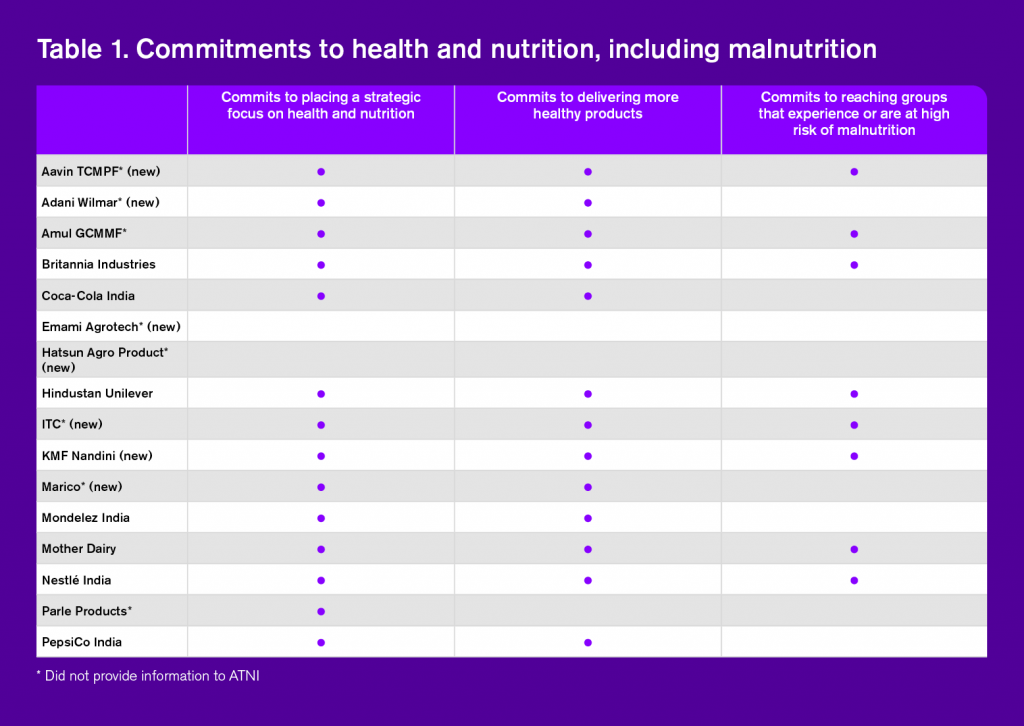
- Table 2 highlights important elements of companies’ performance with respect to integrating nutrition in their decision-making process. However, fewer companies succeed in translating the commitments shown in Table 1 into governance practices. For instance, only five companies conduct nutrition-related business risk assessments at least every 2 years.
- In addition, Table 2 shows that only five companies undertook a strategic review of commercial opportunities available to them by addressing the specific needs of groups that experience or are at high risk of malnutrition. However, none of the five conducted a comprehensive assessment that was then reviewed by their respective board.
- Only four companies were found to have undertaken market research or other types of studies to assess unmet needs of groups experiencing or at high risk of undernutrition and/or micronutrient deficiencies. Nestlé India and Hindustan Unilever are the only companies that have conducted such research for all states where they are present.
- In ATNI’s 2016 Index, five of the currently assessed companies (Mondelēz India, Nestlé India, PepsiCo India, Coca-Cola India, and Hindustan Unilever) recognized that they had a role to play in tackling India’s challenges of increasing levels of obesity and diet-related chronic diseases. For the 2020 Index, ATNI has raised the bar: companies were asked about how they intended to tackle those issues, as described in their formal commercial strategies. Not all of the previously mentioned companies have met this new standard, although some newly assessed companies do (ITC, KMF Nandini, Marico). Furthermore, six of the 16 Index companies set out how they intend to address undernutrition and/or micronutrient deficiencies in their formal commercial strategies, as Table 2 shows.
- Finally, one way to evaluate whether companies deliver on the strategic commitments they make is to assess how healthy products contribute to the company’s financial performance. Nine of the 16 companies provided such information to ATNI (growth of the revenue of healthy products, either in absolute or relative terms). However, four lead the way by publicly disclosing this information – ITC, Marico, Hindustan Unilever and Amul.
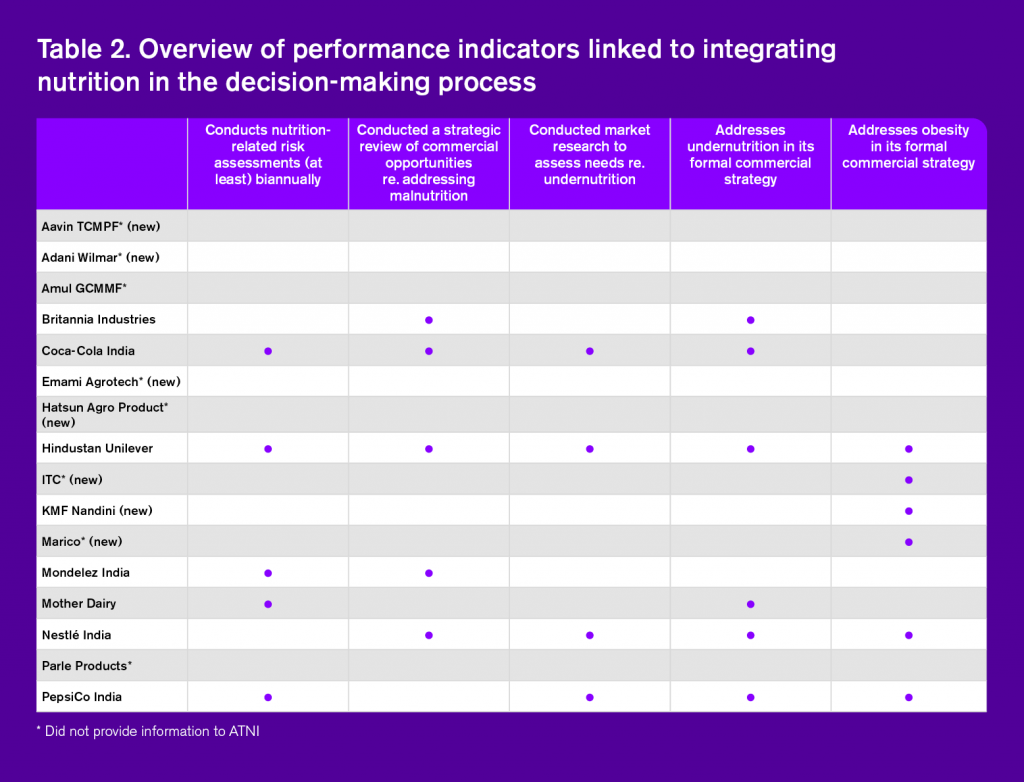
To improve and accelerate efforts towards improving consumers’ nutrition, food and beverage manufacturers in India are encouraged to:
- Further integrate nutrition considerations in their core business functions. Companies taking this approach are likely to have a greater and more sustainable impact on improving Indian consumers’ access to nutritious foods, and on the population’s health, than those companies that attempt to address these issues as isolated from other corporate decisions. Thus, companies are encouraged to develop a formal nutrition policy or strategy that is part of their overall commercial strategy, including their objectives and activities related to nutrition (specific to India), and to publicly disclose the strategy.
- Further translate commitments into specific actions. Compared to the 2016 Index, the 2020 Index results show stronger and renewed commitments in this area. However, these commitments must now be translated into concrete and measurable governance practices.
- Determining business opportunities to address malnutrition requires a careful analysis of the population’s nutritional needs, as defined by public authorities – a complex process. Yet only a few companies have taken steps in this direction, by means of strategic reviews or market research. More opportunities would be discovered to tackle malnutrition if more companies were to do this.
- Demonstrate how they support the nutrition and health priorities set out in the National Nutrition Strategy and POSHAN Abhiyaan through their commercial operations.
- Promote healthy products further. All companies should already have clear plans and targets in place to increase sales of their healthy products. Companies are also encouraged to publicly report on progress towards these targets.
A2 Nutrition governance and management systems
- The level at which companies assign ultimate accountability for implementing their nutrition strategies is indicative of the priority assigned to achieving results. As Table 3 shows, Britannia Industries, Hindustan Unilever, Mondelēz India and Nestlé India are the only four companies that assign such responsibility to a CEO or an executive that reports directly to the board. Britannia Industries and Hindustan Unilever lead in this regard by publicly disclosing this information. Furthermore, Mondelēz India has improved since ATNI’s 2016 Index, when the company assigned this responsibility to a committee that reported to the board.
- Another way to evaluate whether companies have effective management systems to deliver their commitments on nutrition is to assess whether the delivery of their nutrition plans or strategies is subject to an annual standard internal audit and/or an annual management review. Significantly, only Nestlé India and Hindustan Unilever report conducting both; the latter leads this area by publicly disclosing this information.
- All but three companies (for which no information was found) obtained recognized food safety certifications. Thirteen of the sixteen assessed companies obtained ISO 22000:2005 certification; and Coca-Cola India is the only company among these that has already moved on to ISO 22000:2018 certification.
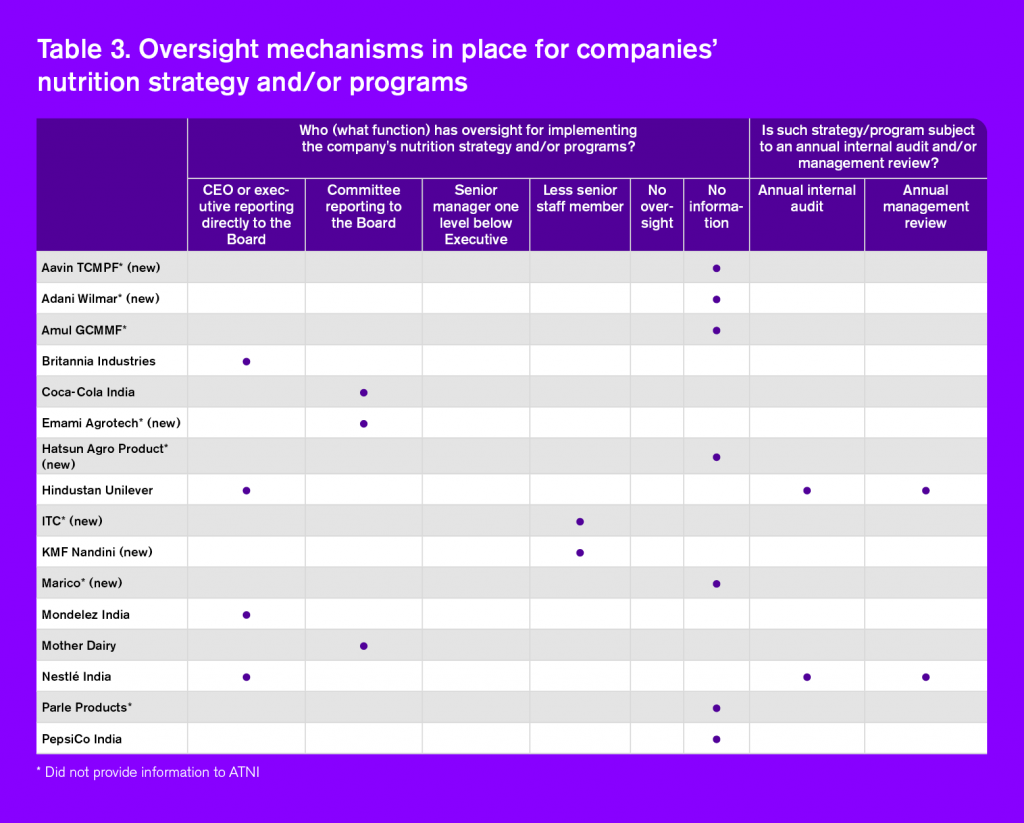
- A new element of the 2020 Index is consideration of the actions taken by companies to prevent food loss and waste (FLW). Minimizing FLW makes a substantial contribution to increasing access to food but it is a topic that few companies seem to be addressing. However, six companies have incorporated FLW tracking and prevention tools into their management systems. Nestlé India leads in this area not only because of the number of measures in place but also because it published a commitment to reduce FLW in 2015. Nestlé India’s fresh milk district model in Moga for direct procurement is highlighted as best practice.
To improve and accelerate their efforts towards robust nutrition governance and management systems, food and beverage manufacturers in India are encouraged to:
- Ensure that accountability for implementing the nutrition strategy is clearly assigned to specific, relevant functions within the business with the capacity to drive the nutrition agenda.
- Ensure that nutrition plans and strategies are assessed regularly by internal audit and/or are subject to an annual management review to monitor progress. ATNI is concerned that only two companies have such measures in place.
- Food adequacy is intrinsically linked to sustainability. Food needs to be available and accessible at all times, in the present and for future generations; FLW threatens both current and future food accessibility.
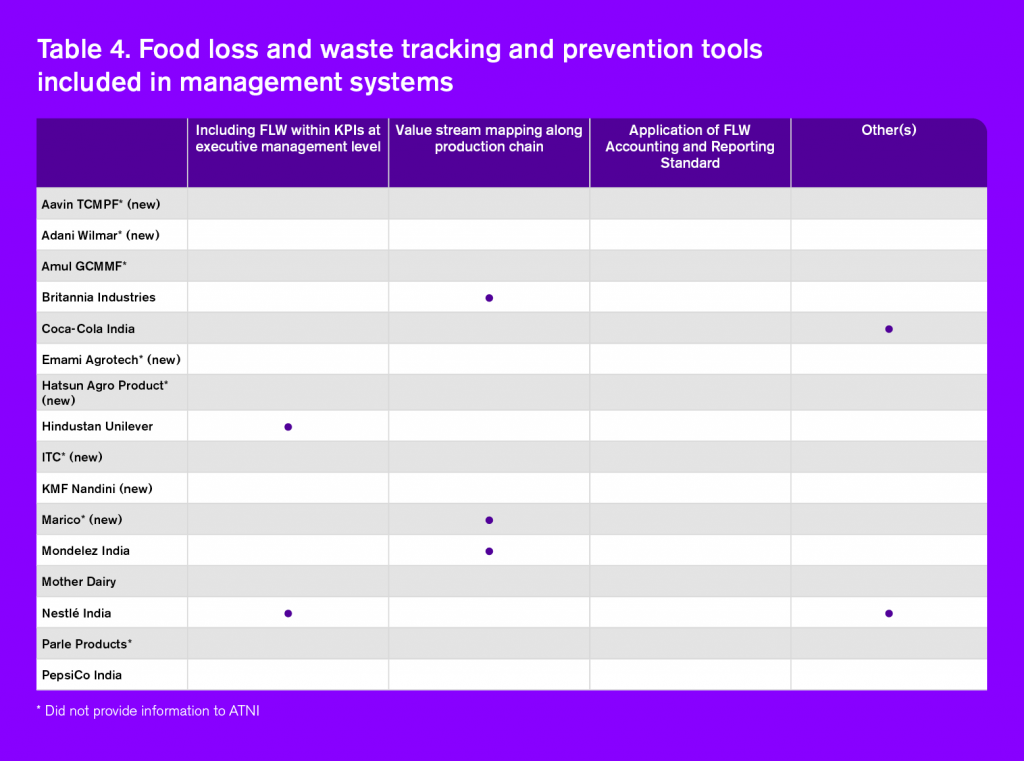
A3 Quality of reporting
- Six of the sixteen companies in the 2020 Index publish formal, annual reports that discuss their respective approaches to tackling nutrition issues in India. Such transparency is considered best practice. Nestlé India, Hindustan Unilever and Coca-Cola India all published annual reports at the time of the India Spotlight Index 2016 and continue to do so. Britannia Industries used to be the only India-headquartered company to publish an annual report in 2016. Currently, both Britannia Industries and Marico (new to the 2020 India Index) do so. Since the 2016 Index, PepsiCo India, which used to occasionally publish sustainability reports that addressed nutrition issues, now publishes them on an annual basis.
- All six companies encompass obesity and diet-related diseases in their reports, and five report on implementing strategies to address undernutrition and micronutrient deficiencies through product fortification (an improvement since the 2016 Index). The remaining companies do not yet publicly disclose their efforts to address India’s nutrition challenges.
Reporting on tackling obesity and diet-related diseases in India
- In the 2016 Index, Hindustan Unilever was the only company of the ten assessed at that time, which reported comprehensively with respect to its work to prevent and address overweight and obesity and diet-related chronic diseases. Now, Nestlé India and PepsiCo India also provide more extensive explanations of their efforts to tackle these challenges in India, as Table 5 shows. However, no company publicly reports on its performance against all of their own objectives and targets for India. Britannia Industries, Coca-Cola India and Marico report to some degree, although their reporting is not as comprehensive as that of their peers.
Reporting on tackling undernutrition and/or micronutrient deficiencies in India
- Regarding undernutrition, the four companies that provided a limited commentary on their work to prevent and address undernutrition in India in 2016 – Britannia Industries, Coca-Cola India, Hindustan Unilever, Nestlé India – have all increased their level of disclosure. Their reporting is not limited simply to general statements on product fortification and consumers reached: most of them also provide an outlook on future plans for the Indian market, and challenges faced. Again, no company publicly reports on its current performance against all objectives and targets for India.
- Notably, PepsiCo India has also started to publish information on these issues specifically for the Indian market in a comprehensive manner which represents great improvement in the quality of its reporting. Britannia Industries is the only Indian-based company that publishes such annual reports.
Recommendations
To improve their transparency about how they are improving consumers’ access to nutrition, the 16 major food and beverage manufacturers in India assessed for this Index are encouraged to:
- Publicly and comprehensively report on their approach to tackling all forms of malnutrition issues in India on an annual basis, within the standard corporate reporting cycle.
- Report clearly on progress against commitments made and targets set.
- Set out a clear future plan for further improvement.
